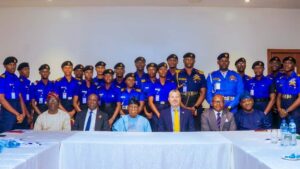
Minister of Marine and Blue Economy, Adegboyega Oyetola, (third left); Secretary-General of the International Maritime Organization (IMO), Arsenio Domínguez (third right) with other officials and cadets of the Maritime Academy of Nigeria, Oron, during the IMO Secretary-General’s visit to Nigeria, on Thursday.
With a clear vision, strategic partnerships, and a relentless drive for excellence, the Acting Rector of the Maritime Academy of Nigeria (MAN), Oron, Dr. Kevin Okonna, is redefining maritime education in Nigeria, KOREDE DAMIFOGO writes.
In the last 10 months, the tenure has been marked by ambitious reforms designed to reposition the Academy as a world-class institution, capable of competing with counterparts such as the Regional Maritime University in Ghana, the World Maritime University (Sweden), and the Indian Maritime University.
Since his appointment, Dr. Okonna has launched structural reforms and infrastructural projects that are already transforming training, industry perception, and Nigeria’s maritime human capital development.
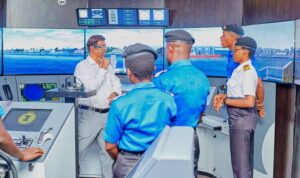
Five-Year Strategic Development Plan: A Roadmap to Excellence
At the core of these reforms is a Five-Year Strategic Development Plan, recently approved by the Governing Council and awaiting ministerial endorsement. The plan identifies the Academy’s strengths, weaknesses, opportunities, and threats, aligning them with SMART goals designed to be achieved incrementally within five years.
Short-Term Goals (2024–2025): Infrastructure rehabilitation, improved cadet welfare, return to the national grid, and new professional body partnerships.
Mid-Term Goals (2026–2027): Full international accreditation of courses, increased global partnerships, expansion of simulator technology, and international faculty exchange programs.
Long-Term Goals (2028–2029): Recognition as a leading maritime institution in Africa, matching global standards for training, certification, and employability.
“This is not just a document,” Dr. Okonna emphasized. “It is a living guide for gradual and measurable improvement that puts sustainability at the center of our growth.”

Tackling the Seatime Challenge: Bridging the Gap
Globally, cadet seatime remains one of the toughest barriers for maritime graduates, and Nigeria has not been spared. With the absence of a national shipping line and limited Nigerian-flagged vessels, many cadets graduate without the required onboard training experience, rendering them unemployable.
Dr. Okonna has made cadet placement for mandatory seatime training a front-burner issue. The Academy is in talks with Nigerian Shipowners Association (NISA), Shipowners Forum, and foreign partners, while also intensifying collaboration with the Nigerian Maritime Administration and Safety Agency (NIMASA).
For 2025, MAN has budgeted funds to facilitate cadets’ placement, even considering partial financial support for the cadets.
“This is not a problem unique to Nigeria,” Okonna stressed. “Countries like the Philippines and India, despite having vibrant shipping sectors, also face similar bottlenecks. What matters is our commitment to innovative solutions and collaboration with global partners.”
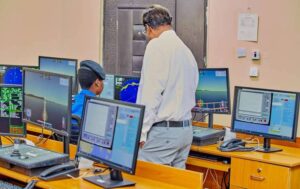
Recognition of Nigerian Certificates: Restoring Confidence
Another challenge Dr. Okonna is tackling head-on is the global recognition of Nigerian seafarers. By working closely with NIMASA and the International Maritime Organization (IMO), the Academy is pushing for higher compliance with the STCW Convention (Standards of Training, Certification, and Watchkeeping for Seafarers), which remains the gold standard for seafarers’ training worldwide.
“This is not just about MAN Oron; it is about Nigeria’s credibility in the global maritime space,” he noted.
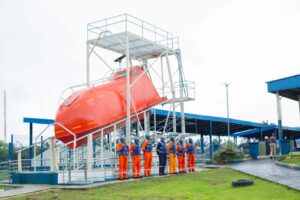
Powering the Academy: Return to the National Grid
For eight years, MAN Oron relied solely on generators and solar systems, one of Dr. Okonna’s earliest achievements was restoring the Academy to the national electricity grid, a decision which has saved cost and ensured twenty-four hour power supply for critical operations. This initiative has directly boosted business and residential comfort for cadets, staff and members of the host community.
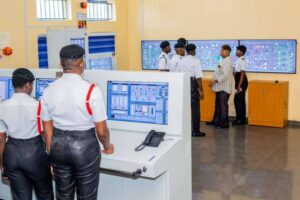
Professionalisation of Cadet Training
A key reform is the mandatory registration of cadets with internationally recognized professional bodies such as: the Nautical Institute (NI), UK, Institute of Marine Engineering, Science and Technology (IMarEST), UK.
Also, the Academy recently signed a MoU with Abuja MoU on Port State Control for West and Central Africa for partnership in respect of the Port State Control Officers Course a course developed by the Academy for the Abuja MOU.
This ensures that graduates leave not just with certificates, but with industry-recognized memberships, enhancing global employability. For instance, students of Nautical Science and Marine Engineering are now required to register with professional maritime bodies to advance their careers beyond the Academy.
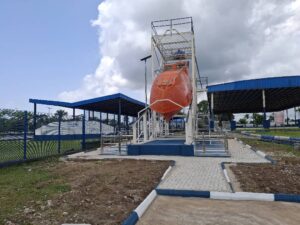
Modernizing Facilities: Hostels, ICT, and Smart Learning
The Academy has embarked on infrastructure upgrades critical to creating a conducive learning environment:
Hostels Rehabilitation: Cabins have been rehabilitated and upgraded with solar backup systems, ensuring 24-hour study conditions. Other facilities renovated include: Smart Classrooms, Lecture Theatres, ICT/ Resource Centre, office blocks, library etc. These improvements bring MAN Oron closer to international training standards.
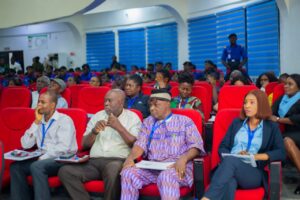
Building a World-Class Faculty
Recognizing that equipment is only as effective as the instructors who use it, Dr. Okonna has overseen the recruitment of seven senior marine professionals, including foreign Master Mariners and Chief Engineers with global sea experience. Faculty exchange programs with maritime universities in Asia and Europe are also in the pipeline.
Simulator Revolution: Training The Future
One of MAN Oron’s standout strengths is its simulator suite, which are amongst the most advanced in Africa.
The Multi-Functional Classroom (MFC) Simulator integrates eight simulators – High Voltage, Dynamic Positioning, Electronic Chart Display and Information System (ECDIS), Global Maritime Distress Safety System (GMDSS), ARPA/RADAR: Bridge Watch-keeping, Preparatory Course (BWPC), Ship Manoeuvring Simulator Course (SMSC), Liquid Cargo Handling, Pilotage.
It is an innovation created through the partnership between the Academy and the globally recognized simulator manufacturers, the Applied Research International (ARI).
Real-world shipboard conditions are simulated here, ensuring cadets graduate with hands-on experience comparable to peers trained in Europe or Asia.
The Academy also has a full Mission Deck Simulator, Full Mission Engine Simulator and Ocular Vision Simulator. They are all composed of the Instructor’s Station, Training Station and De-Briefing section. With the Simulators, real life Sea scenarios are depicted to give users practical experience of what is applicable at Sea.
The Full Mission Deck Simulator, Bridge Watch Keeping and any kind of emergency situation that occurs on-board any type of ship both in shallow and deep Sea situations can be simulated. It is also capable of simulating any type of vessel like Warships, Tanker Vessels – LNG, LPG Oil Tankers, etc.
The Full Mission Bridge simulates movement of the various engine parts of a ship, it can simulate single stroke engine, double stroke and 4 stroke engine movements. It also has the capability to simulate everything that goes on in a real life engine room including the engine room Watchkeeping. Also monitoring of lubricating oil, level of oil and other moving parts of the engine as well as emergency engine room situations.
The Ocular Vision Simulator is an equipment worn on the head, it launches the user into a virtual engine room where he or she does not only visualises what the engine room looks like but can actually operate any function as in a real life engine room. Here, functions like operating of valves, switching on machineries within the Engine of a ship can be done as in real life engine room situation.
It is commendable that Nigeria is amongst the first 5 Countries in the World to acquire this technology. The simulators have both International and Nigerian Port Areas and navigational channels for exercises.bAll the simulator-based courses are accredited and many of the courses are always fully booked ahead of schedule.
MAN’s Role in Nigeria’s Marine and Blue Economy Policy
Dr. Okonna also underscored MAN’s central role in the recently approved National Policy on Marine and Blue Economy, with the Academy designated as a lead human capital development agency under the Federal Ministry of Marine and Blue Economy.
“Without trained manpower, the blue economy cannot function optimally. Our role is to supply the talent pipeline – seafarers, engineers, port managers, inspectors—that will power this new economic frontier,” Okonna explained.
Conclusion
By restoring electricity, reviving cadet seatime prospects, introducing global professional linkages, modernizing infrastructure, and securing MAN Oron’s role in Nigeria’s blue economy, Dr. Kevin Okonna has consolidated the Academy’s transformation into a globally competitive institution.
The challenge now lies in sustaining these reforms, ensuring they survive beyond his tenure and stand as a permanent shift in the Academy’s trajectory.



